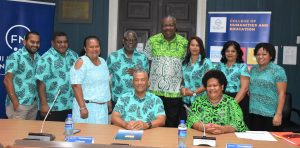

FNU Acting Vice-Chancellor Dr William May (sitting) with Dean CHE Professor Unaisi Nabobo-Baba and FNU representatives at the International Webinar on Climate Change, Security and Sustainability of Ocean States.
The Fiji National University (FNU) co-chaired the International Webinar on Climate Change, Security and Sustainability of Ocean States this week that featured presentations and discussions regarding the environmental crisis.
The virtual meeting was a collaboration between FNU’s Centre for Interdisciplinary Studies and Sustainable Development, the Macmillan Brown Centre for Pacific Studies at the University of Canterbury and the Commonwealth Climate Resilience Network (CCRN) under the Association of Commonwealth Universities (ACU).
CCRN was established by ACU in partnership with FNU, the University of the South Pacific (USP) and the University of the West Indies (UWI), to link Commonwealth Universities for climate change resilience-related research and faculty exchange.
The webinar was co-convened by FNU’s Centre for Interdisciplinary Studies and Sustainable Development Director, Professor Nii-K Plange and MacMillan Brown Centre for Pacific Studies Director, Distinguished Professor Steven Ratuva.
Panelists featured academics from FNU, University of Canterbury, Sri Lanka, Mauritius, Seychelles and West Indies.
The University of Canterbury Vice-Chancellor, and ACU Council Chair, Professor Cheryl de la Rey delivered an inspiring keynote address and encouraged the participants to make an impact.
“We have to have impact on what’s happening beyond our institutions. Impact on policymakers, impact on practitioners and importantly, impact within the political sphere,” Professor de la Rey said.
“There is a dire need for research, policy and practice and so we must as universities work with our local communities, work with our societies, with governments and regional organisations and international agencies.”
“Much is resting on you who have gathered at this webinar as experts. We have seen with the pandemic how our science experts have made a difference in our communities, so I want to urge you as experts to keep at the forefront of your thinking how you translate your expertise into impact so that our communities’ future and the future of our planet is more positive than the outlook we have today.”
FNU Acting Vice-Chancellor, Dr William May, in welcoming the panelists and participants, added that the Fiji National University recognises the immediacy of the climate emergency and the need for systemic change.
“It is evident that this climate change threat is deep, as it touches the lives of families, individuals, and government development agenda and policies,” Dr May said.
“FNU has taken a proactive step and placed environmental sustainability as an all-encompassing theme of our Strategic Plan 2021-2026.”
“As a future-focused University, FNU seeks to undertake research with real-world impact, aligned to national priorities and with global relevance.”
“To this end, FNU is willing to collaborate with regional and international Universities to maximise resources in both funding and research expertise.”
FNU’s Centre for Interdisciplinary Studies and Sustainable Development Director, Professor Nii-K Plange said the webinar brought about some real and critical discussions on the impact of climate change on the communities and different sectors and the resilient and adaptation strategies that are beginning to be realised through research.
Professor Plange said there is also a general agreement on the need to record indigenous knowledge and practices on disaster responses, including climate change, which has been passed down generations as it contains valuable information that needs to be preserved and shared.
Professor Ratuva added that the collaborative work of the Commonwealth Climate Resilience Network was well demonstrated by the Webinar. He said the event also provided the space for not only sharing ideas and research activities, but establishing contacts for joint research across Ocean states.